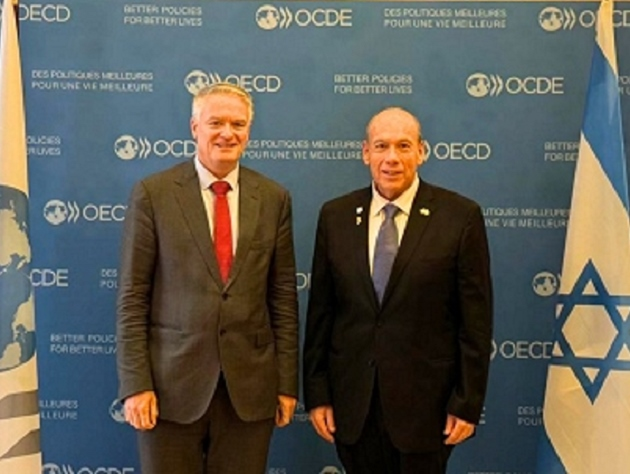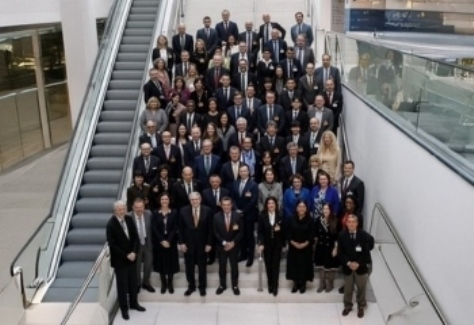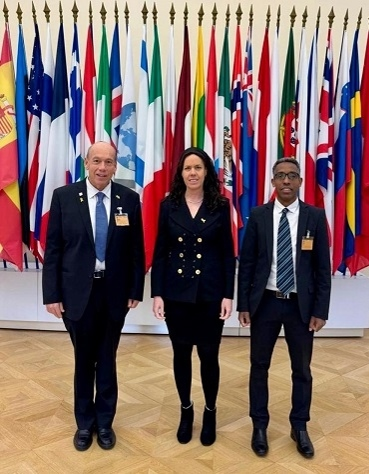The State Comptroller, who serves as the President of EUROSAI, called upon the participants of the conference held under the auspices of the OECD, to adopt an approach of "giving a voice to the voiceless", focusing on populations worthy of advancement, alongside advanced audit systems for reinforcing the effectiveness of the state audit
04.02.25
State Comptroller Matanyahu Englman, who serves as President of the European Organization of Supreme Audit Institutions (EUROSAI), led an international conference of state auditors from 35 countries worldwide (28-29.1.2025). The conference, which focused on public financial management, was held in Paris under the auspices of the OECD.
The Conference opened with greetings from Comptroller Englman and Ms. Elsa Pilichowski, Director for Public Governance at the OECD. In his speech, the Comptroller emphasized the importance of performance audits, and called upon the state comptrollers to adopt an approach of "giving a voice to the voiceless", focusing on populations worthy of advancement: "In Israel, for example, we are conducting audits in matters such as the placement of children at risk in boarding schools, foster care and adoption, and the protection of minors in cyberspace. Furthermore, we are currently leading an international audit in the matter of population aging".
Comptroller Englman pointed out the importance of audits in matters of sustainability and the environment, and especially audits examining countries' readiness for disasters caused by the climate crisis: "Only recently, Los Angeles suffered an unprecedented wave of fires. Hundreds of thousands of residents were evacuated from their homes and the damage caused is estimated at tens of billions of dollars. As state comptrollers, it is our responsibility to assess the risks before they are realized and examine whether our governments are prepared for them. We are committed to this task, for the sake of our own generation and for the sake of future generations".
After the greetings at the opening of the conference, a discussion was held between Ms. Elsa Pilichowski and Mr. Gene Dodaro, Comptroller General of the United States. The two spoke about the important role fulfilled by the supreme audit institutions that are characterized by independence and innovation, in the audit conducted in a variety of fields – from the method in which governments ensure fiscal stability to the method by which they are prepared for the era of artificial intelligence.
Afterwards, a discussion was held focusing on performance audits and the challenge involved in the rectification of the defects arising from the audit. This discussion was attended by representatives from the state audit institutions of Finland, Holland, Spain and the European Court of Auditors.
Other sessions held during the conference dealt with the following aspects:
- A discussion on financial audits led by the Belgian Comptroller, with the participation of representatives from the audit institutions of Portugal and Great Britain.
- A discussion on the influence of audits on sustainability matters was held, led by the Portuguese State Comptroller, with the participation of comptrollers from Brazil, Poland, Slovakia and Malta.
- A discussion on the methods whereby audit institutions can contribute to the way in which citizens understand the budgetary challenges their countries are faced with. The discussion, led by the Norwegian comptroller, was attended by Comptroller Englman, alongside comptrollers and representatives from Germany, Switzerland, Japan and Slovakia.
- The question of financial sustainability from a forward-looking viewpoint was presented by Mr. Einar Gørrissen, the Director General of IDI, the INTOSAI (International Organization of Supreme Audit Institutions) development initiative.
Comptroller Englman presented his colleagues with examples of various types of audit tasks published by the Israeli Office of the State Comptroller, including the placement of children at risk in boarding schools, foster care and adoption (social audit); national preparedness for the drone threat (security audit); road safety (systemic audit); cyber security of medical devices and protection of the data stored in them (cyber audit); preparedness for the outbreak of inflation (cost of living audit).
During the discussion, Comptroller Englman expanded on the ways in which audit institutions can contribute to the manner in which the citizens are partners in the activity, and demonstrated how the Israeli office is working to make the audit reports accessible to the general public by means of abstracts, graphs and short video clips summarizing the main points of the audit in a clear and concise manner. Likewise, some of the audit institutions that are members of EUROSAI also publish blogs and podcasts, such as the Israeli Office of the State Comptroller's "Situation Report" podcast.
"I called upon my fellow comptrollers, representatives from 35 countries worldwide, to adopt advanced audit tools in order to advance our work for the benefit of the public", concluded Comptroller Englman who serves as the President of EUROSAI. "The key message is: Be innovative, be creative, be relevant. The knowledge we shared here will undoubtedly improve our work".
"As state comptrollers, we have an external and extensive viewpoint of all the government and public bodies subject to our supervision. Our access to data is an asset that allows us to conduct performance audits at the highest level. But, at the same time, we must preserve our position as independent and credible state comptrollers, strictly observing professional ethics".
"The discussions held during the conference illustrated the great importance of audit contribution in long-term preparedness for hazardous events and global crises, for the benefit of our nations' citizens".
Comptroller Englman expressed his deep appreciation to the OECD Secretary-General, Mr. Mathias Cormann , for sponsoring the conference, and emphasized the importance of strengthening cooperation between EUROSAI member states and the OECD: "We look forward to the meeting next year in order to continue our joint journey of learning and collaboration".














